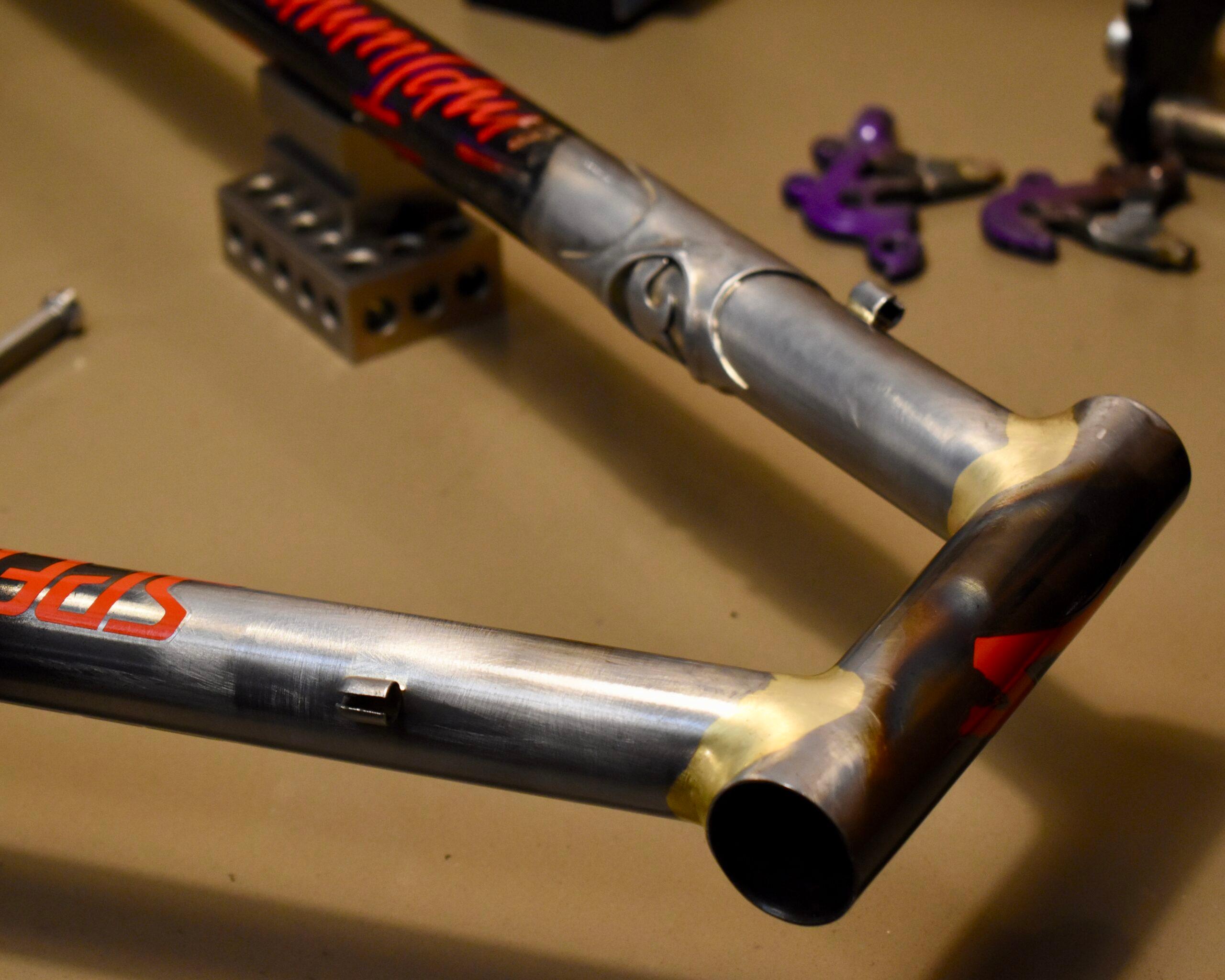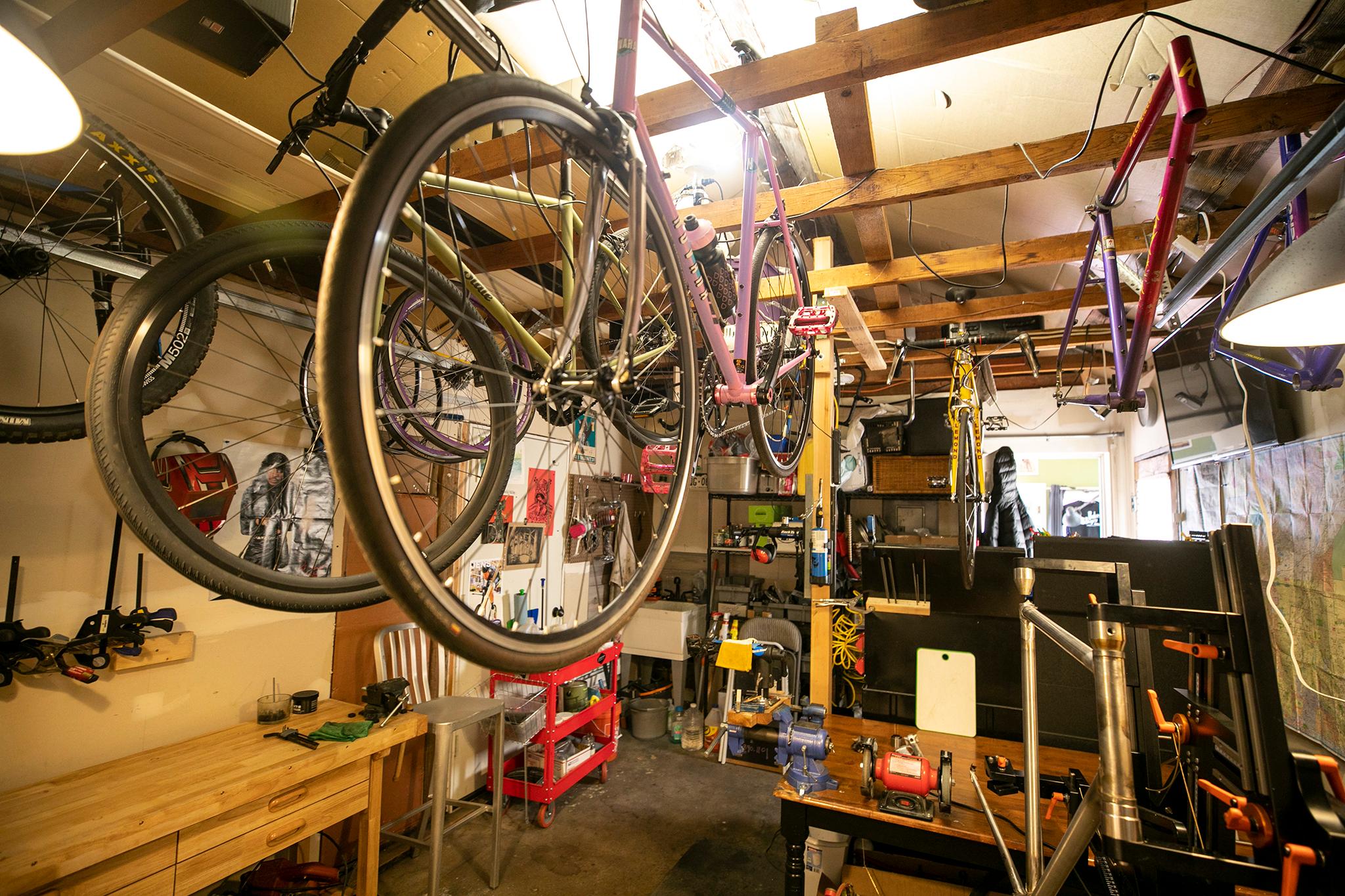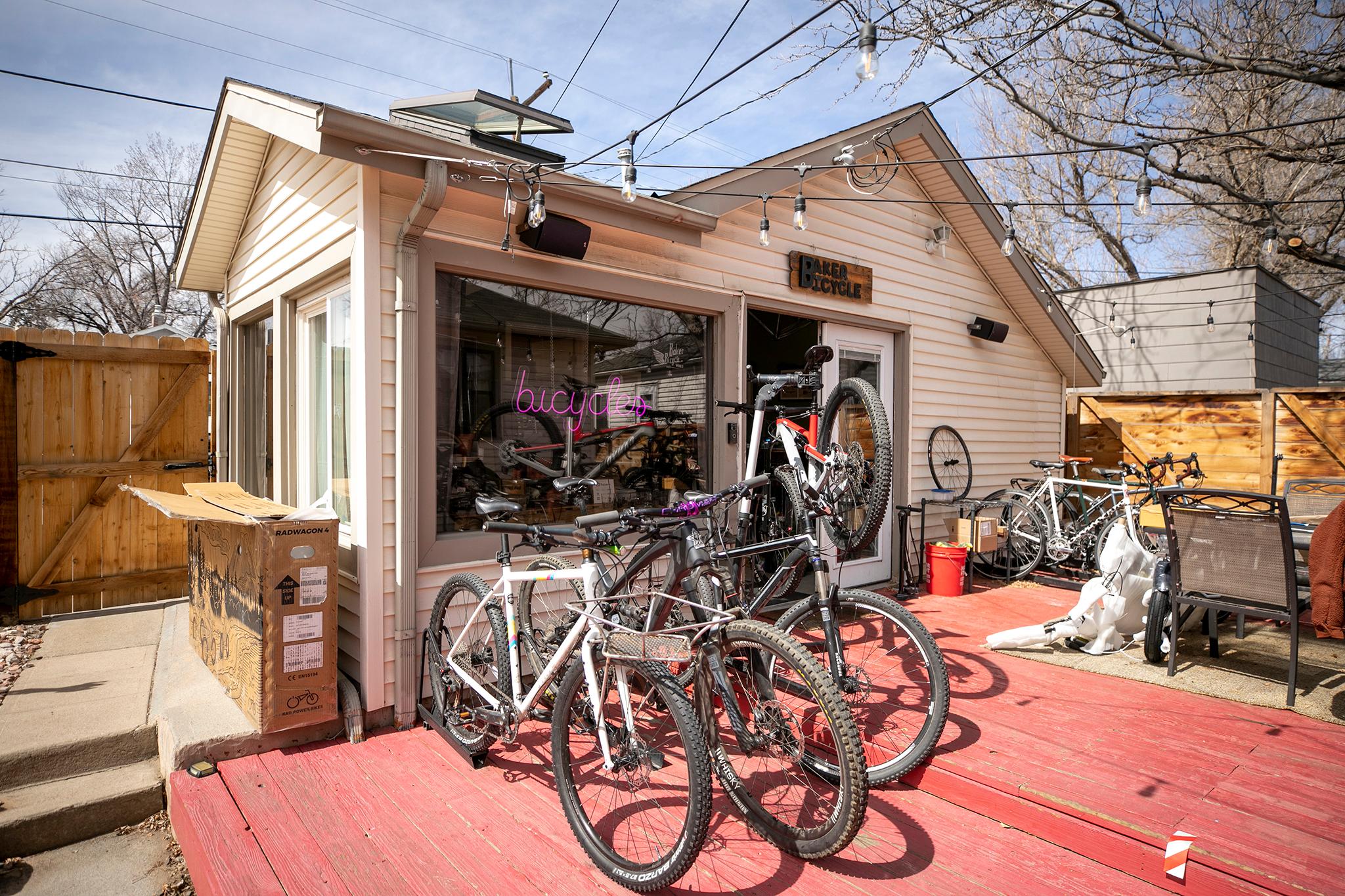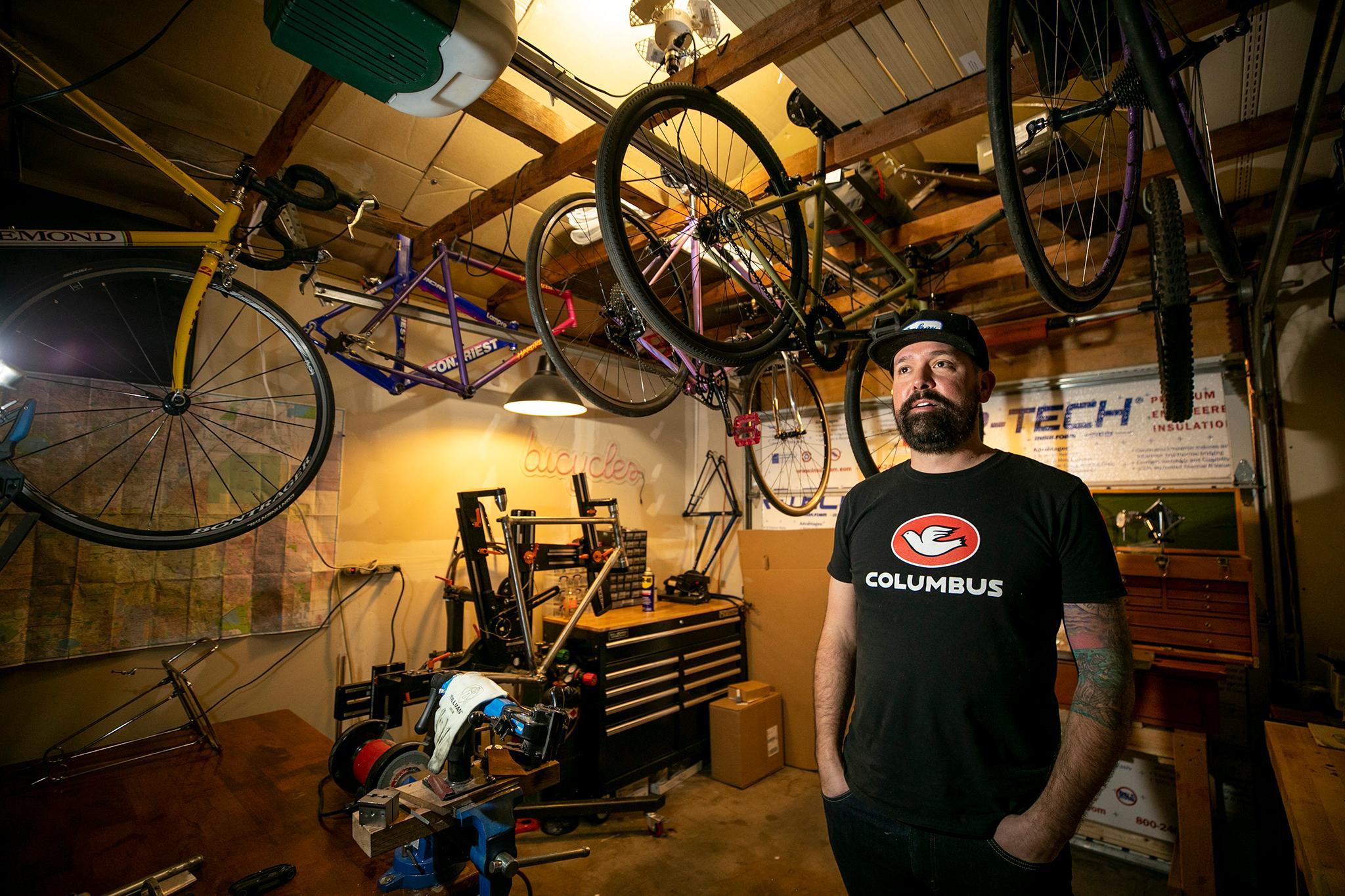When Paul Todd got married, he and his wife bought each other bikes as wedding gifts. Todd rode that bike daily for about 30 years, until a few months ago when he got in an accident, cracked the frame in one place, and bent it in another. He brought the bike to a few shops in Denver but everyone turned him away -- it was a tough, time-consuming job. Then he found Baker Bicycle Works, tucked away on a street a few blocks from the University of Denver.
Shop owner Scott Baker gave the bike new life, in a way Todd said was as much a repair job as it was an artistic endeavor. Baker, who also builds his own frames, left parts of the repaired frame unpainted, exposing torched metal and highlighting the melding between old and new. Todd said he nailed it.
It's jobs like this that have earned the small, independent shop a devoted customer base, and a reputation for picking up repair jobs other shops won't, or perhaps can't. With over 25 years of experience all over the country -- including a few spent fixing bikes for pros at the Ironman World Championships -- there's no job too difficult to tackle for Baker. For him, that's all part of the fun.

Baker grew up in upstate New York, the son of a pastor in a dairy farm community. There, bikes meant freedom.
"Certainly my parents weren't going to have any money to buy me a fancy bike," Baker said. "My first bike was put together from pieces thrown in the trash. It was a pretty cobbled together Frankenstein bike."
He began working in bike shops at age 15, to earn money to upgrade his ride. As a teenager in the 1990s, Baker was drawn into a world of bikes that felt part of alternative culture in a country built for cars.
"Bike shops and the bicycle industry was a safe haven for weirdos," he said.
But Baker never expected to have a career in the bike industry. He studied English and philosophy in college in Tennessee and figured he would become a teacher, until he got his first teaching job and realized it wasn't for him. So he went back into bike shops, got married, and opened his own shop in St. Louis.
"That was in 2008, which, if you remember anything about what happened in 2008, not a great year to be in any sort of business," he recalled.
Baker lasted two years before going bankrupt. He got divorced and spent some time bouncing between bike shops in Vermont, then Oregon and then California, learning not just how to fix things but what to do when the fix doesn't work.
"I think a lot of mechanics get good at seeing the same thing over and over again, and being able to do that pretty well," he said. "But when you get the wildcards and you get the things that are off kilter, and things start to go sideways, that's where you really see excellent mechanics reveal themselves."

Then Baker got the call from Kona, Hawaii, to work as a mechanic supporting the Ironman World Championships -- though he'd never raced a day in his life.
The event draws 2,500 athletes every year. For amateurs, entry alone costs over $1,000, not including travel, lodging and the cost of a prior Ironman to qualify for a spot. For pros, it's one of the few chances to win prize money and sponsorships in the sport. Athletes prepare for months, ship their four- or five-figure bikes across the world and show up for one day of competition.
And when they get there, some teeny tiny part of someone's spaceship-looking bike starts causing big problems.
"That event has three crucial elements: a bike ride, a swim and a run. Two of those you can do bare naked, one of those requires the machine." Baker said. "I saw people having meltdowns... and so you have to keep this sense of chill and say, 'Alright, what do we got? We got 48 hours, let's figure out how to get this going.'"
It's an energy Baker brings to his shop in Denver, even if he's no longer doing live repairs out of a truck in the middle of the road during a world championship.
When COVID-19 canceled the Ironman World Championships and Baker got laid off, he moved to Denver. At first, he felt so burned out from his time in Hawaii that he worked night shifts unloading trucks at Target.
But bikes drew him back in. He realized he wasn't burned out from the bikes themselves but from the industry, which Baker felt was pushing fancier and fancier bikes down customers' throats without thinking about what people really needed.
So a year ago he took a second try at his own bike shop. Unlike some stores that focus on specific types and turn away things like electric or triathlon bikes, Baker takes everything, because at this point he knows how to fix everything. He tries to fix broken parts before selling customers new ones, and occasionally takes on tricky projects like Todd's wedding bike, which might not have been worth the money but was meaningful in a different way.
"That experience with his bicycle was its own form of meditation for me, so I got something back out of it that wasn't financial," Baker said. "I want it to be fun for me to do business too. I don't want to just be part of the machine."

In addition to fixing bikes of all shapes and sizes, Baker has started building and selling his own custom racks and frames. To him, it's art.
Every year, the bike industry comes out with the newest models -- added carbon fiber, gears that shift using Bluetooth, new braking technology and more teeny tiny little pieces.
But what Baker loves about building bikes is what he calls their "classic beauty," hand-crafted from start to finish.
"He's a craftsman as much as he is a mechanic," said regular customer Matt Wester, who first met Baker when he bought a bike from him with a custom rack. "He's not really trying to buy customers, he's been trying to buy relationships with people that appreciate his work."
Baker sees those relationships not just with customers, but also with the bikes themselves -- it's all part of his process.
"It's a very romantic experience to see a box full of parts that by themselves aren't very useful," he said. "And all of a sudden, you've taken a box of lifeless stuff and given them a whole new meaning and a whole new sort of beauty, and I absolutely want that to come forward in the way I present my business."













